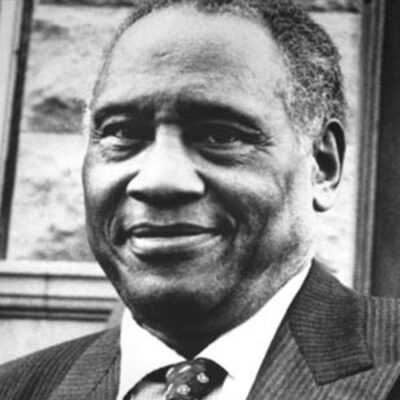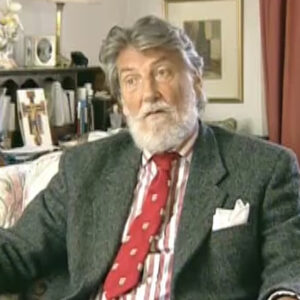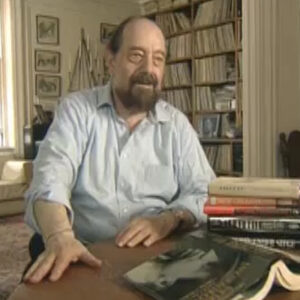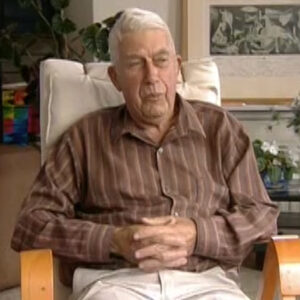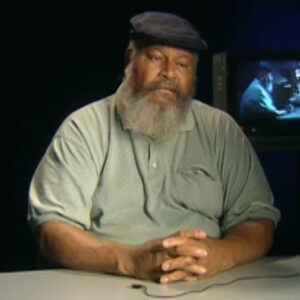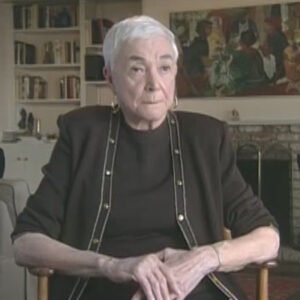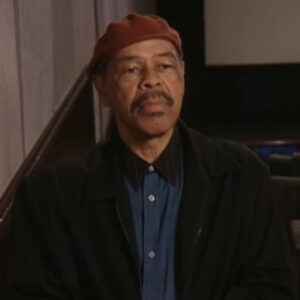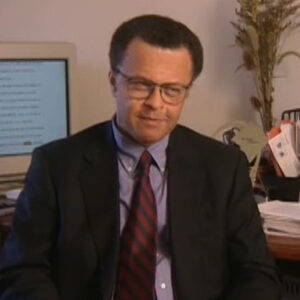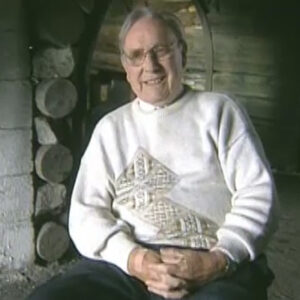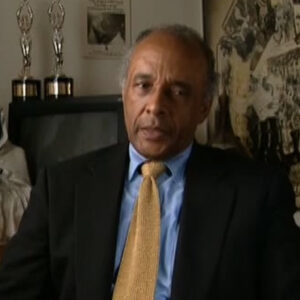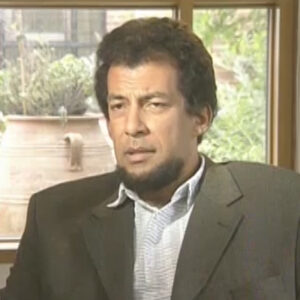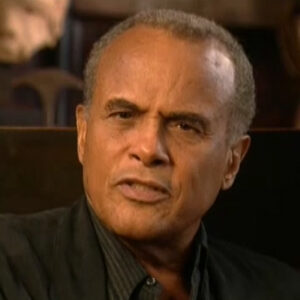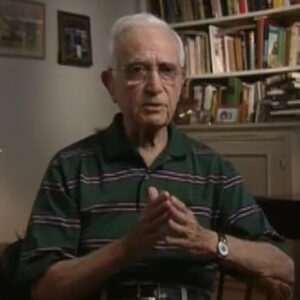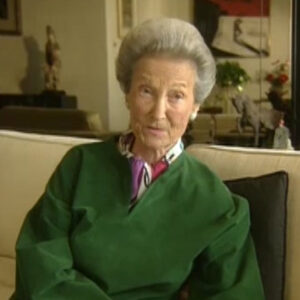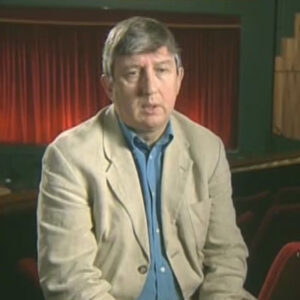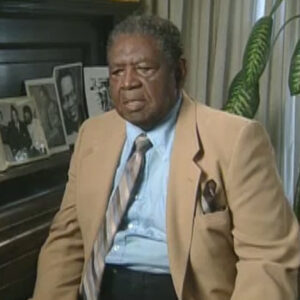Speaker I joined the NAACP staff in 1948 and I remained on the NAACP staff until 1977, so I effectively spent 29 years on the staff of the NAACP, first as assistant field secretary and then as national labor secretary. I did have some leaves of absences to teach and to do some research.
Speaker And for a brief period, I was a special consultant for the Economic and Social Council of the United Nations.
Speaker Oh, when I joined the staff, I had already been active in the New York branch of the NAACP involved. Mm. Yes. I meant to ask you want me to look at you. I meant to ask you about I keep on looking at the cabinet I saw I start again. All I’m sorry are in 1948 when I joined the staff, the NAACP was on the verge of great expectations. It was a period of very significant membership growth. The NAACP had been winning important cases before the United States Supreme Court and 48, the great decision of the court and Shelly versus Kramer. And following restrictive covenants, the teachers equalization of salary cases, many other cases, the voting cases and the NAACP was preparing to bring the cases that finally became Brown versus Board of Education that resulted in a fundamental reinterpretation of the Fourteenth Amendment, the equal protection of the laws clause as it involved non-white people in the United States. So this was, of course, the great victory of the NAACP, the great achievement that gave a whole new interpretation of the meaning of race in American constitutional law. And this was the development of a huge expansion of NAACP branches. The expansion of NAACP branches took place in the industrial centers and places like Detroit, which was the largest branch of the association in Cleveland and Baltimore and Chicago. And one of the reasons why I was invited to join the staff of the NAACP is that the association was making a turn towards the black industrial working class for blacks in unions, blacks in the labor movement. There was a field in which I had done some studies which I had done some work. And when I became labor secretary, this was an attempt to develop a program that would be responsive at NAACP program that would be responsive to the needs of black industrial workers and to bring them into the orbit of the NAACP.
Speaker OK, now, at the same time, there was a huge movement of leftist activity to essentially captivate those same people. What was the what was the relationship of the NAACP to the left and how did they view it?
Speaker Well, the NAACP had a formal relationship that I think that in order to establish the background of this one would have to say that this was the period of the terrible development of the Cold War. This was the period when relations between the United States and the Soviet Union sharpened greatly great intensity of conflict. And the American Communist Party, simply as a spokesman of the Soviet Union, simply as a representative of the Soviet Union, made a direct attack upon the association. And I am afraid that that’s not what I said for that.
Speaker OK, so we’re talking about the Cold War, right? Yes, which one? Ask me your question again.
Speaker What was the relationship between the NAACP and the left with the intensification of a Cold War during that period, the Communist Party and its various front organizations made a an overt attempt to develop a mass base of the black community, especially the black working class. They sent people to NAACP branches. They try to impose their program on a variety of issues. And the NAACP responded in a very principled way. The NAACP maintained an independent position. We rejected the McCarthy McCarthyite and all of their nefarious doings, and we rejected the Stalinists. We rejected the Communist Party. The NAACP maintained an independent position at all times. If I may give an example of this, I hold in my hand a memo actually I did once out of my in my hands. That was McCarthy. Is that.
Speaker Yeah. OK, so you’re saying that you have an independent stance.
Speaker The NAACP remained independent. Neither the McCarthy it’s the NAACP at all times maintained. And well, when I read, I will have to take my class. When you’re talking about the NAACP at all times, maintain an independent position. Neither the McCarthy aides nor the communists, we maintain the we never subordinated the NAACP program. And what was that program? And uncompromising struggle for full justice, full equality, equal treatment under the law for black people in states. And that program was not compromised either for the communists or for the McCarthy ites in 1950. And this is, I think, a typical example of how the NAACP responded in terms of moral and principled positions on these issues. 1950, Roy Wilkins, the acting secretary of the NAACP, sent a memorandum to NAACP branches explaining the association’s position and precisely the questions you have asked. And I would like to relate to two issues that Mr. Wilkins deals with here.
Speaker I should explain that during the period of the war, during the after 1941, when talking is important, after the Soviet Union was attacked by Germany in 1941, as they had done so many times in the past, the American Communist Party did a complete flip flop in its position. And now the American Communist Party and all of their front organizations attacked the NAACP, attacked a Philip Randolph for the March on Washington movement for the struggle they conducted for the elimination of segregation in the armed forces and for equal job opportunities in national defense industries. They accused Mr. Randolph of fascist appeasement because of the struggle he conducted for black rights. They attacked the NAACP because the NAACP represented black soldiers and court martial activities were in Massachusetts at an army hospital. Black soldiers were being discriminated against and three black nurses protested. They were court martialed. The NAACP represented them and cut them off while the Communist Party attacked the NAACP. Because we were interfering with the Soviet Union’s war, we were not giving full, full support to the war effort. They accused the NAACP in any case of doing that. Well, Wilkins response to this weakness, by the way, was very conscious of the fact that the Communist Party at that time applauded the federal government for the internment of Japanese Americans on the West Coast. And the NAACP was very sensitive to the racial implications of that.
Speaker Could you break a moment? Because I am getting very, very tired.
Speaker This is a problem I dry mouth and I want to warn you about this, Roy Wilkins in his in his in the memo to the NAACP branches on the communist issue in 1950, a right wing of the NAACP.
Speaker Remember that during the war, when Negro Americans were fighting for jobs on the home front and fighting for decent treatment in the armed services, we could get no help from the organizations of the communist left. They abandoned the fight for Negro rights on the ground that such a campaign would, quote, interfere with the war effort. As soon as Russia was attacked by Germany, they dropped the Negro question and concentrated all effort in support of the war in order to help the Soviet Union. During the war years, the communists sounded very much like the worst of the Negro hating southerners.
Speaker And then the.
Speaker OK, well, let me ask you this, we have a picture of Rowson picketing against the internment of Japanese.
Speaker Japanese citizens, and he is picketing with communists or communist sympathizers, so to speak. So, I mean, it seems to me that there isn’t that much discord. What was how did the NAACP relate to Paul Robeson specifically, especially since there seems to be a range of relationships? Could you talk about how they related, by the way?
Speaker The Communist Party’s position changed at one point. They were opposed to it. Then after the Soviet Union was attacked, they did a complete flip flop and they supported the the internment of the Japanese. And also specifically on the issue of now going to relate to that, Wilkins also refers to in his letter to the branches of this directly involved. Paul Robeson, I think goes to the point that you’re raising, and that is in 1949, the Communist Party, the Communist Party was indicted under the Smith Act and their leaders were eventually sent to jail. 11 of their leaders were sent to jail. But some years before, a group of Teamster leaders, members of the Socialist Workers Party in Minneapolis, were already convicted and sent to jail. And at that time, the Communist Party applauded the Smith Act. And we now know from records that have been made available, they did everything they possibly could to urge the Department of Justice on a conference was held under the leadership of the Communist Party, the Civil Rights Congress. The NAACP was invited to participate. And Roy Wilkins letter to William L. Patterson, head of the conference ahead of the meeting that’s called to protest the application of this letter back to the communist leaders, Mr. Wilkins says as follows. And Paul Robson’s directly involved in a way that I shall explain in a moment. We are wary, too, of your assertive devotion to civil rights. We recall clearly that when the Minneapolis truck drivers were indicted, tried and convicted under the Smith Act, neither the Civil Rights Congress nor its predecessor nor the Communist Party and its associates made any move to assist them. The Civil Rights Congress did not provide tens of thousands of dollars in bail. The Stalinist organizations across the country were not circulating petitions, invading meetings and demanding the passage of resolutions, nor were they conducting picket lines. The Minneapolis men were not Stalinists. Therefore, a hand, not a hand was lifted to aid them. If the Smith Act is a monstrous piece of legislation when used against the 11 communist leaders, as you so loudly proclaim, it was no less monstrous, no less an instrument for the suppression of civil liberties when used against the Minneapolis men, we have the NAACP reject such a part time concept of civil liberties. Now, at this meeting, a motion was made to extend support to the Minneapolis men who had already been convicted, who had already at this meeting, a motion was made from the floor to also defend the Minneapolis man, to give support and to condemn the Department of Justice for its first conviction under the Smith Act. Paul Robeson gets up and says now he makes a famous speech which says we should not be confused. And he simply argues that the critics of the Communist Party from the left, these members, these are the Minneapolis truck drivers, were members of the Socialist Workers Party. He argues that they really don’t deserve civil liberties, that the communists should have civil liberties to criticize. But the critics of the Communist Party from the left should be denied the same rights. And the NAACP attacks Robeson for that very dishonest position.
Speaker So, I mean, ultimately, what are you saying? That you think that that was votes? And do you think it was a group of the communist conspiracy?
Speaker I mean, what I’m saying is that for a period, what I’m saying is that for a period of more than 40 years, Paul Robeson was not a dupe, but very consciously, ideologically was a supporter and a defender and worked for the Stalinist cause. The Stalinist movement first went to the Soviet Union in 1937 and fell in love with the Soviet Union, fell in love with the Stalinist regime.
Speaker He defends the Stalinist regime during the Moscow trials, when Stalin brutally murders off an entire generation of the old Russian revolutionaries and the entire civilized world condemns the Moscow trials. Robson Publico supporting the Moscow trial to say how wonderful Stalin is in this campaign of mass murder. Later on, later on, for example, in the Stalin Hitler pact, he justifies that even after even after the 20th Congress of the Soviet Union in 1956, when Khrushchev acknowledges that Stalin was a monster, acknowledges the crimes of Stalin and after the. An invasion of Budapest, the Soviet invasion of Hungary, when thousands of people all over the world left the Communist Party. Robertson remains loyal to the Stalinist movement in this country. For example, how fast a typical example of an American Stalinist was even too much for the Howard farce of that period. They leave the party, not Robson. Robertson remains free until he dies in 1976, remains loyal to the party. And one should understand that being a Stalinist is not the same thing as simply wanting to right wrongs and make a better society and fight for against injustice.
Speaker This man made a fundamental commitment to Stalinism and to a totalitarian perversion of the socialist idea, and the NAACP was very, very critical of him. For these and related reasons, one should understood that ropes and ropes and was an example of a self-willed delusion about the nature of the Soviet Union and the Stalinist movement. And he defended the Stalinist terror and mass murder over a period of some 40 years. And this, in my opinion, is a crucial aspect of the history of Paul Robeson. So much as I know we’re in the centenary of his of his birth. But we must not celebrate a sanitized myth of Poirot’s.
Speaker Why did the suggestion housing. Yeah.
Speaker Yeah. Well, uh, let me ask you a question.
Speaker Why do you think I mean, aside from the south of this thing, why do you think many continue to support. Russia has said the Soviet Union, the. Just all the way through without deviation. Why do you think?
Speaker Well, this is only an interpretation and obviously I don’t know, except that, you know, as I said, I think that this was an example of a will self-delusion about what the Soviet Union represented. I think he accepted the notion that the Soviet Union, for all of its horrors, for all the mass murder or the terror, somehow represented the triumph of socialism, that he was a committed socialist and he believed that this was the path to achieve socialism. No, this is a terrible thing. It’s a terrible tragedy. The Stalinist campaigns of mass murder, for instance, during the period of collectivization of forced collectivization where we don’t know how many millions of people Robert Conquest in his study called the Great Terror, you know, documents of millions of people were systematically destroying these campaigns.
Speaker If this is the way to achieve socialism and socialism must be a terrible thing. But ropes and ropes and believe this, I think that the red dawn, that the future that he spoke about that would belong to the working class would only be achieved through such extremist means. The reality is quite different that this really represents the most fundamental sense, a terrible perversion, a terrible distortion, a totalitarian distortion of the socialist idea. And he embraced that. I think that this was the crucial point that he refused to recognize that Stalinism was a totalitarian perversion of the socialist idea. And he embraced that and for a period of 40 years, did everything possible to assist aid to support it.
Speaker Do you think that that the perversions that you state, in other words, in your discussion, you need to change socialism with Stalinism? Yes, it is that in fact, the case. In other words, he would have said, I think from what I know, that the socialism and then the Stamoulis and Stalinism, you know, with problems, but not enough to warrant not being a socialist.
Speaker Well, I think that from what I read, I read his work very carefully. I’ve read a great many of his speeches and of course, the Duberman biography, which is the definitive work that we have. I think it’s clear that he thought at least he said so, that what Stalin was doing with the Stalinist movement was going with all of its horrors, with its terror of mass murders, that this was the way to achieve socialism. That’s the only rational explanation. He wanted to achieve socialism. He wanted to have a communist society set so and that this was the way to do it. Now, I think that this is a horror. This is a monstrous horror.
Speaker But I think that a final close examination of his political position boils down to that, that he agreed that these are the things you have to do to achieve socialism, no matter how monstrous, how horrible, no matter how many lives are lost, no matter what crimes are committed against mankind. This must be done to achieve socialism. And that justifies everything. And that’s the horror of the politics of Poirot’s.
Speaker OK, now let me ask you this.
Speaker In this country, there was a lot of red baiting and people were destroyed by this association.
Speaker How what was in the NAACP, NAACP position on that?
Speaker I mean, what did they do to the NAACP? Had absolute contempt for the McCarthy movement at the NAACP, had no illusions about the NAACP, carefully demarcated itself in a great variety of ways.
Speaker As I said before, neither McCarthy and all of its horrible VAUTHIER horrible works was a vicious operation, and neither the Stalinists, neither one or the other. The NAACP remained true to its original program of the struggle for racial justice and for full equality for black people in the United States. And that was never compromised, was never compromised for the McCarthy ites, nor McCarthy, nor compromised for the Stalinists. The NAACP fought both.
Speaker OK, how did the NAACP leaders relate to Paul Wilson as a popular figure?
Speaker I mean, because at one point they gave him an award and then they change that.
Speaker What I would say about it is, OK, but it’s not as if I apologize for the want of it, but I can’t help it. All right.
Speaker Yeah, yeah, I mean I mean, how do they I mean, they were at one time colleagues, well, not colleagues.
Speaker I think that they I think that universally among the leaders of the association, there was a great regard for Mr. Robertson as an actor and as a singer. There’s no question that his performances on Broadway and elsewhere as telo simply awe inspiring. This is obviously a very talented man, uniquely gifted man, a great musician, a wonderful singer. This is this is part of the tragedy, of course, of Paul Robeson. So it should be understood that he got the Spingarn Award for the six. Was it for the forty six, got the Spingarn Award and forty six as an actor for his contributions to the drama of the American theatre, his contributions as an actor, as a dramatic actor, as a Shakespearean actor. So I mean, he didn’t get the Spingarn Award for any political reasons. He got to stop the spin on award for his professional achievements as an actor and and as a singer.
Speaker Well, that’s not quite true because he was more of a you know you know, the spring of award is not given for singing or dance. It’s given for you know, it’s like the positive image for black people is not. Yes, no, that’s not quite.
Speaker So the Spingarn Award is for a specific contribution in a particular field of endeavor. It says so. And I think I’m fairly, fairly accurately paraphrasing with that so that everybody who got it, you know, Duke Ellington, for example, for his contributions to music and all the others wanted for their particular contributions in a given field of endeavor, for their accomplishments in the specific field of endeavour, in no way must be regarded as an endorsement of Paul Robeson’s political ideas.
Speaker So that’s the case then why the two or three years later, did they take out an article and attack him because of the Cold War?
Speaker Well, why were you for the size of that dilution? And of course, I don’t want to cooperate.
Speaker No, no, no. He didn’t change. He didn’t write it. But the perception of the nobility towards him changed. Something in the real world changed. And that is the Cold War.
Speaker And the American Communist Party made the attacks upon the NAACP a very significant part of its program, as Roy Wilkins says in his memorandum to the branches shortly thereafter. He writes, In recent years, talking about this period that you asked me about efforts on the part of the Communist Party against us have been intensified. The shrillness with which they are now demanding the right to infiltrate the NAACP requires explicitly statement of the association’s position and a warning to our branch to be alert to such attempts. The association’s position is made clear in the following documents, which would serve as a guide to our branches. And then he goes on to deal with the matters that I’ve already discussed. There is an intensification. Part of part a major part of Communist Party activity today is now directed to what they called the Negro question. And this meant trying to infiltrate the NAACP branches, trying to impose their program, trying to get support for the Soviet Union from the NAACP. And a major question, and they absolutely went crazy on this issue was the Marshall Plan, how they try to get NAACP branches to pass resolutions denouncing the Marshall Plan had nothing to do with the NAACP program. So what changes is the fact that the Communist Party and the Civil Rights Congress and all there are many, many front organizations now make a frontal attack upon the NAACP and try to impose their program. And Rozin is what they’re saying. Oh, racism is very active in all of this. Rabson is being is being quoted. He’s making speeches and he’s writing. Rabson is very, very much a part of what I’ve just described. And he’s defending the Soviets, calling for assistance to the Soviet Union. And he’s calling for support for the communist movement and he’s denouncing the Marshall Plan. He’s doing all of it. Or one has to do is read the daily work and the official publication of the Communist Party.
Speaker So so in terms of civil liberties issues that affected Paul Wellstone, what was the position, for example, the passport case? What was the Navales position when they tried when they took over person’s passport away? What did you know?
Speaker As far as I recall, the NAACP took no position on that. No, I may be wrong about that.
Speaker But my recollection is that the NAACP took no position on the you may want to examine the formal record on that. OK, but I mean, that’s a massive civil and abuse of civil liberties and.
Speaker And Paul Robeson is an American citizen. Why wouldn’t a black American citizen, why wouldn’t the NAACP speak up of its own principal there?
Speaker Well, I cannot. I cannot I do not recall what the I think the association issued a statement. I can we can we start the business about the about the passport afresh. Now we’ll you say, oh, OK. All right. All right. My recollection now, you know, I started I think that my recollection is that the that the NAACP issued a statement critical of the of the action of the Justice Department, but that the NAACP did not formally engage in any activity on behalf of Rabson on this issue. And why was that? I said the association made a judgment. All organizations make Gelb’s words or anything like that. I was not on the staff. And I don’t I don’t know what what year was that? I don’t know what it was that late for 51? Well, I was on the stage, so please, please gather. I simply all I can do is to report to the best of my knowledge. The association issued a statement of dismay at the actions of the government, but the association did not become involved in the defense of Paul Robeson on that matter. I can certainly report what I know.
Speaker OK, do you know what the NAACP, the organization’s response to the Paris peace talk speech where Wilson said that that he was misquoted, saying that black Americans might not find if they were called to attack the Soviet Union?
Speaker The NAACP was very critical of that. And the NAACP issued a statement saying that they do not believe that Mr. Robeson speaks for the overwhelming majority of black people in this country. Jackie Robinson was very critical of that. And across the board. Across the board. If you read the black press, many, many black black leaders of many, many different persuasions denounced Robertson for that speech.
Speaker And also there was a we talked a lot of it. I talked about this before.
Speaker How how do you think the African-American community, from your position as a member of the Northeast and it seems, is up for grabs and had a lot of black grassroots support, would you say that that’s a correct estimate?
Speaker All depends. Well, what happens? What period? I think that this time.
Speaker Well, at the present time, we have been given a sanitized myth of poor robs the victim as hero who stood up to the white oppressors who stood his ground and title of was autobiographies. Here I take my stand. Ah. And so there is a myth. There’s a myth of the black man who stood up to white racism and was victimized by it. And that entirely ignores his political history, ignores the other side of his life activity. And so he becomes a hero on the grounds on the basis of that sanitized mythology. Political material is omitted.
Speaker The political material is not there. What we get is the marvelous singer, the great actor, the man who stood up to the McCarthyite. But what we don’t get is the man who defended Stalin in the Moscow trials. What we don’t get to defend Stalin in his anti-Semitic mass murder campaigns. What we don’t get is, is Paul Robeson, the man who defended Stalin in the in the course of the Stalin Hitler pact. We don’t get the entire a 40 year history of defense and support for a movement based upon terror and mass murder. And the Robeson was a major spokesman for that. That is cleansed out of that history.
Speaker Well, uh, it’s I think it’s reinterpreted, but it’s cleansed. Sanitized. It’s not it’s acknowledged. It’s just a different spin is put on it. Nobody says it didn’t happen. They just explain it a different way. Sanitize me. They don’t mention it. It is always mentioned. It’s just not. It’s just not.
Speaker No, no, no. It’s mentioned in a very distorted, distorted way that he was true to his political beliefs. He stood up to the McCarthyite because he defended his ideas. But one never really knows what those ideas were. There’s a vague, general sense that he was fighting for human freedom, a vague, general sense that he stood up against the basis of vague, general sense that he was for civil liberties and civil rights. But the specifics of those political beliefs are not examined well.
Speaker But they’re very specific in terms of Stalinism or very specifically.
Speaker But that’s what is left out. That’s that’s what is so wrong.
Speaker They are specific that they’re very specific. It’s just that you don’t interpret them the way that he interpreted.
Speaker No, I think we have we have a disagreement on this point that I think in the popular perception of Rabson is based upon a sanitized myth. I know you keep saying that and I keep saying that’s my that’s my observation from what I’ve read, from my interviews, my read, my thought, from what I get from my for my students, I get this my the comment. I just made it and is based upon facts. I have many, many young black students from all over the country. I teach at the University of Wisconsin, the Afro-American Studies Department, and this is what I got from them. This is the image that they have. This is the sense they have. It’s now two generations later, they have a sense of Rabson. And it is the sense that I’ve just commented on. This is their perception of ropes.
Speaker And why do you think that perception is the one that seems to survive? Why do you think that?
Speaker Well, there are several reasons, in part because there is such a great need for heroes, in part because it’s such a great need for heroes. And even if it’s not justified, well, we’ll sort of cut a few corners and make up a few facts and leave a few things out through evasion, through omission, through half truths. The patching up will make a hero. And that’s what has happened. And it’s very sad because in our midst, the political content, the hard core of the political reality of life.
Speaker Explain your statement earlier that essentially you thought in certain instances that Paul was basically a liar, that he didn’t like, that he came back and fed the American public lies about them.
Speaker Yeah, and this is a very important part of his history. And I need a drink again. Yeah, because my mouth is getting very dry. I’m pushing it and I’m just trying to get you to be I honestly, I’ve done this many times.
Speaker I’m not proud, but I really hope you use this last. When I said about my students and about credit and about creating a hero. Yeah. Yeah.
Speaker Know that’s about making me all right. A very important part of Robeson’s history involves the issue of the anti-Semitic pogroms, the anti-Semitic murders of a period of many decades in the Soviet Union.
Speaker Soon after Stalin came to power in the 1930s, he began a concerted campaign of literally murdering off of the major intellectual and artistic figures of the Jewish community, some some very, very great and important persons like the great poet Isaac Mandelstam, Isaac Barbel, the great Isaac Baba, one of the major figures in 20th century literature, important figures in the theater like Solomon, because it’s never a campaign that we have all the documentation on this. And also since the demise of the Soviet Union, we have additional material now that confirms Stalin’s really murderous campaign to wipe out the cream of the Russian Jewish intellectuals, both Bubble and Mandelstam, the gapo picking them up in their homes in the middle of the night. They were never seen again, never seen again. Mikael’s we know pantalones, personal orders, direct orders from Stalin was murdered. He was beaten to death. His body smashed. Now, now Robertson is in the Soviet Union in forty nine, 1949, at the height of this, at the height of a of a new revived terror against the Jewish population, that Stalin paranoid streak about Jews. There was the so-called Jewish doctors plot, the Jewish doctors prepared to murder him. And this begins a whole new campaign against Robson’s their Jewish leaders, who he had no Jewish artists, Jewish musicians managed to manage to reach him, managed to tell him about all this, managed to give him information. He meets the last days with Itzik Pfeiffer, who tells of who manages to communicate and what is going on and now knows what he lies in his speeches throughout the Soviet Union. He denies that any of this is going on. He says have been meeting Jews all over. He hasn’t heard a word about this. I believe I’m paraphrasing him accurately that that there’s no such issue. This is just all a lie made up by the by the enemies of the Soviet Union.
Speaker Just think what it would have meant when he was in the Soviet Union if he had denounced this. We had taken a position comes comes back, comes back to the United States and does the same thing, lies again and again and again denies that there’s such an issue. Then why is that? The Jewish artists and writers and scholars are being murdered by Stalin, denies that there’s a concerted state. A public campaign of terror against Jewish intellectuals and writers and artists, he lies and he knows better. He knows better since since the demise of the Soviet Union. We’ve gotten additional information about this and hear Paul Robeson consciously lies in the speeches he makes throughout the. He denies any of this occurred. And we know he knew he knew. One has to contrast this, for instance, with what somebody who he knew, Illya Ehrenberg, an important journalist and writer in the Soviet Union who also received the Stalin Prize. By the way, Robert from 1952 gets the Stalin Prize, goes to Russia, gets the Stalin Prize, as does Arenberg. But after Stalin dies, Arenberg tells the truth. Arenberg says, I lied about all this. I knew better, but I had to do this to save my neck in those close to me. Rabson until his even after even after Stellas, that even after the 20th Congress, even after the Soviet leadership themselves acknowledged that Stalin was this is mass murder. Acknowledge the crimes of Stalin.
Speaker Robson keeps on and he lies. This is what I meant before about the sanitized, sanitized myth, the ropes, because this too is part of the history of Paul Robeson. And this has been cleansed out. This has been cut out. This has been sanitized. And we celebrate a myth when we leave all this material out.
Speaker But I can’t tell you what was in I don’t know what was in his head. I can’t answer that. I mean, I simply don’t know. But what I do do now, what I can simply deduce from the historical record is that he saw himself as a political figure. And I think this is about being a black spokesman. A black leader was part of that was a component of you know, you must remember that he really was not involved in any of the great racial struggles of his time. He spoke to other black leaders. He functioned really in an unofficial capacity as a major spokesman for the Communist Party and for the Soviet Union. He led no mass struggles. He argued no court cases. He he didn’t lead any movements of black people while a Philip Randolph was organizing the March on Washington movement against segregation in the armed forces and for jobs for black people in national defense industries in 1941. Robeson is attacking all that because that was the Communist Party line would interfere with the defense of the Soviet Union denounces a Philip Randolph, a Philip Randolph, major black labor leader of our time, great civil rights leader. He attacks the March on Washington movement. So one has to deal with the fact that his relationship to the black community, the black working class, was a very complex one here. If he has a choice between support for the Soviet Union, the Communist Party line against the best interests of the black community, against Randolph, against the NAACP, just imagine attacking the NAACP because the NAACP intervened to prevent the Court-Martial of black nurses in Fort Devens, Massachusetts.
Speaker He started to make about if there’s a choice between.
Speaker Well, yeah, and that’s what I was I was doing well for him. What is paramount is the defense of the Soviet Union and support for the Communist Party lot. And I think that that takes, as he demonstrates, after 1941, after the Soviet Union is attacked, that demonstrates, I think, what his priority was. His priority was his political commitment. And if that meant going against the best interests of the American black community, as it did after 1941 during the war in attacking a.. Philip Randolph and attacking the NAACP and attacking the mass movement for equal justice for black people because it would get in the way of defending the Soviet Union. He has he has no hesitation. He has no hesitation in denouncing a Philip Randolph as a fascist appeaser. Those were the words he used.
Speaker One can make a case flip case. One can say he felt at the NAACP was an appeaser with the American government and and and calling out more radical approaches to to resolving social issues and racial issues.
Speaker And if somebody who wanted to make that case, they could point to the collusion of the NAACP and the State Department in that article that the government had put in the crisis to condemn Horowitz. And this is the one I was talking about, and that’s documented in the book.
Speaker But the fact of the matter is, the specific things that I’m talking about during the period that that I was on the staff. And for me, this is a crucial example of what the what the reality is, is 1940 to a group of black versus at Fort Devens, Massachusetts, have been court martialed because they have been they have been vigorously protesting the way black soldiers have been treated, that they have been discriminated against, have been getting the right kind of medical care, terrible things may have. And they speak up, they’re court martialed for this. They ask the NAACP for the NAACP, sends lawyers, investigators, the NAACP representing Robeson and the Communist Party attacked the NAACP for this. Because we’re impeding the war effort.
Speaker We’re behaving like fascist appeasers because we defended a group of black nurses who are protesting the terrible medical treatment of black soldiers. We’re getting the message.
Speaker This is the reality. I mean, all the other stuff is just just, you know, sloganising. This is what happened during that period. And and I think it’s very significant because it indicates where his political priorities were.
Speaker Well, then at all time, at all times our politics came first at all times, at all times. What you see, one has to understand the nature of Stalinist parties, the American Communist Party.
Speaker We now know all the documentation has become so clear. We have this study being done.
Speaker By Harvey, you being published by Yale University Press, several volumes already of how the Soviet Union, the Comintern micromanaged at certain periods, certain periods, not at all times the American Communist Party specifically on its treatment of, quote, the Negro question. And he was simply being manipulated like a puppet on these things. And I do not respect them for this.
Speaker Uh.
Speaker What would you say if, as I’ve indicated, that the American government and the NAACP got together to publicly crucify votes in the crisis? They did.
Speaker I don’t know what you’re referring to. I’m not aware of any crucifixion of a role in the crisis. I mean, I simply have to say I don’t know what you’re referring to.
Speaker OK. Uh, well, I think it’s been pretty clear I played in terms of the know why you think with the support of the party groups, the the party. I mean, what is your take?
Speaker Well, I mean, it’s meaningless, I say. Oh, you’re in many situations and we know this in many other cases, the party made a decision that you shouldn’t join the party, that you will be far more effective for us not being a member of the party and doing all the things that we ask you to do. So I think it was a political decision of the party not to join the party.
Speaker A tactical.
Speaker Yes. And we know that in many other cases, this has been revealed again and again and again.
Speaker You must remember that with the demise of the Soviet Union, records are being made available for the first time, all sorts of things are now becoming available to scholars and much is being revealed. And in many cases, such as in this case, the decision for a person not to join the party is a party decision.
Speaker OK, let’s confirm this. This discovery about Thoroughgood, you know about, but I’m off the record all you know about because all this comes much later, you know, about Thoroughgood being in touch with you. I mean, I know exactly what was happening. You know, Thurgood was manipulating them. You know, the NTSB had to protect them, if I could call them nothing that they didn’t already know. The NAACP was perfectly able to handle the Stalinist than anybody else inside the organization. So that, you know, the notion that the New York Times board, that the NAACP needed the help of the FBI keep coming. Absolutely. That’s laughing, laughing stuff. You know, I and I know exactly what was doing and Thurgood was playing with them, but I got call them what they really know. We knew what they wanted to know. We know what they already know. And it was a way of keeping them out of our hair. We also know that the organization was honeycombed with FBI agents and then the red squads of the various, as they were they were called, you know, we you know, as a friend of mine used to make a joke about how if you went to an NAACP meeting with the CIA, agents were spying on the FBI agents who were spying on the police agents was by not the county agents. You know, I mean, everybody was by everybody else, you know.
Speaker So I mean, we know that shit was going on, you know, and and so Thurgood was manipulating them. And, you know, it was just marvelous that this great personality for this. You know, I just want to do I want to ask you about it. Just just let me just between us, the people in this room, the NAACP had no illusions about those sons of bitches. The NAACP had no clue about Hoover and the FBI, the FBI.
Speaker You know, the NAACP was a very difficult position. The NAACP was under attack by the southern racists.
Speaker The NAACP was having very severe financial difficulties because the court cases, the NAACP had much on its plate and the NAACP had to cope with this problem. But I can assure you, I was there. And I’ll tell you some some stories off the record, if you like, how the NAACP had no illusions about who these people were or whatever corporation it is that they did. It was a bare minimum that they had to do.
Speaker And I asked this question before, but I think it was our personal relationship with Walter White and we welcome the military.
Speaker Never. Really?
Speaker Yeah. Did they ever really talk, you know, so.
Speaker Well, once once again, I was not privy to any of this.
Speaker What I gathered from the literature is that at an earlier period before Robinson becomes very politically active or to some degree afterwards, but during this period on Broadway, he and Walter White socialize together. They went to parties together. Duberman documents this when Walter White lived for nine Edgecombe Avenue and Rupp’s in the very near. They lived at 555 Edgecumbe and they would see each other socially. And this has been talked about. People that I know talk about parties and gatherings. Oh, Walter White was very much involved with the kind of avant garde theatrical literary world and Robson’s Until He becomes openly about Stalinism was part of that. So I think Walter, with some period, although it changes dramatically by the early 50s, I think that Walter White did have some personal contact, some social contact and not personal social and had a social contribution. As far as I know, Wilkins never did what I sensed. And I got to know Roy Wilkins very well.
Speaker I spent almost I spent I spent 30 years with Roy Wilkins. My sense is Roy Wilkins didn’t like ropes. In contrast, why do I think so like that presently?
Speaker Whereas my sense is that that Roy Wilkins.
Speaker Roy Wilkins was tenuously was genuinely bothered by the moral implications of Robson’s political positions. Roy, I think, felt that they were fundamentally immoral. That there’s something terribly wrong with this is to come out of any kind of sense of phony patriotism. Any of that nonsense just felt that there’s something wrong and immoral.
Speaker And he didn’t like.
Speaker And so did that get played out later on when the NAACP sort of went after them?
Speaker Well, I don’t know if the NAACP went after him. I don’t have any evidence now. Well, one article, one article is it is is hardly going after I that’s I don’t think that the NAACP ever went after. That’s a great exaggeration. I don’t know if it ever played out simply that. I don’t think it was the most important thing. And Roy Wilkins life, he didn’t like it. And I think he had some pretty good reasons not to it.
Speaker That was on the record. How about the, um.
Speaker I just I just I guess the only area that I really wish I could explore more is that the antagonistic relationship between the black leadership of our groups and yeah, we’re basically against them, you know, and the support that Rozin seem to have a lot of grass roots. Well, I mean, there is really there’s a real that’s the complexity that I’ve been trying to understand.
Speaker And I don’t think it’s all that complex. You get all of white society attacking a black man for whatever reasons. It’s going to become a hero in the black community. You know, you have you have all these white sons of bitches from the United States now, the head of the Department of Justice and all the governors, the senators on all these fucking races will always come down on them.
Speaker You know, even I’m going to get to defend the feeling, as I do about his politics. You know, I there’s no great mystery about that.
Speaker You know, I mean, they are they really love this shit on me, like the terrible things you’ve done. So, of course, there is a response. You know, I don’t think there’s any great mystery about this. Let me let me let me just so that you and everybody will have a sense of just let me tell you and I’ll do this very, very, very briefly. After the NAACP with Brown versus Board of Education, the Southerners and the Congress is a southern state government. Now, the NAACP spent literally millions of dollars on these court case with back and forth the the circuit courts, district courts back in L.A. And so they decided that, you know, they were really going to do everything they possibly could to cut off the funds. And also, who were these? Who were these people? There is Congress passes, I think it was called the Cox resolution that said that was specifically directed against the NAACP. But any organization, any organization, I’m really abbreviating all this that any organization that had anybody on its staff who at any time was a member of any organization of the attorney general of racial discrimination. I mean, this was the essence of McCarthyism. You know, this is the essence of McCarthyism that anyone who knowingly or unknowingly for awful but certainly knowingly employed anybody on the staff, then they would lose their their their tax-exempt status with the IRS involved a great deal of money. A person on the NAACP staff goes to Thurgood and to Roy. They were both together. And this person says, look, you know about my past. You know, I was a member and a member of an organization of the attorney general’s list, the FBI Adalius files about me. And why did I just resigned? I look at the NAACP is more important than I am and I will quit and I will quietly retire and go into the night. I don’t want to hurt the NAACP and embarrass the NAACP.
Speaker Thoroughgood got up and said, you disgusting son of a bitch, what kind of man do you think we are that we’re going to let them decide who can be?
Speaker And when the time comes that they can decide who I can have on my staff, then I will quit this organization.
Speaker And Thurgood walked out and he said, you know, you sell us short. I’m insulted by your.
Speaker If I could walk out of the room and Roy said that shaking is, you know, you have to have a sense of these were people of some of some complexity and some sensitivity. Is these these people of substance, they ideas seriously. They don’t don’t have any illusions about.
Speaker Thurgood was furious, Taylor was livid, and when the time comes, they can tell me why I can never, ever quit. And Roy said, this is I you have to respect these these people.
Speaker They weren’t simply a bunch of fools who would be manipulated by the government. And then they don’t believe what they would do.
Speaker But they could have been on TV and could have been right on certain levels. I mean, maybe it is.
Speaker And I mean, even the most fervent level of rogues in the beginning was, all right, so he might have been wrong, but he only did it because he didn’t want to be. Oh, bullshit.
Speaker I mean I mean, the fact is, if one time or two times but over a 40 year period of a 40 year period, period.
Speaker I mean, I would like to answer that question again, because I thought I sort of flubbed that answer now, OK, I would like that rather than the them the way I did before, because because I flubbed that starting in the mid 1930s and for the next 40 years until he died in 1976, Paul Robeson unfailingly defended and actively supported and worked for the Stalinist regime, a regime based upon terror and mass murder through every crime of the Stalinists. From the Moscow trials and the doctors, the anti Semitic campaigns and the Hitler Stalin pack and the invasion of Hungary in 56, through it all, even though many people throughout the world left people deeply involved in the communist movement left.
Speaker Among them, many important black figures like Claude McKay, who is a black author, very important black author and poet who was a delegate, a special delegate to the Fourth World Conference of the Communist International in Moscow, 1922. He later breaks with the party and warns black intellectuals about the dangers of Stalinism and says it’s bad for black people. Robeson ignores this.
Speaker He he he ignores what Richard Wright had to say, which breaks with the party, ignores when many others feel this. Richard Wright, Paul Robeson stays over a period of 40 years, ignores the experience of other blacks with the American Communist Party, with the world Stalinist over a period of 40 years.
Speaker Robertson remains a devoted Stalinist. This, for me, must be regarded as a fundamental component of the life of that man and any evaluation of Rosnes life must certainly give great weight to this.
Speaker OK, there is a long history. There is a long history, a very long history of the black experience with the communist movement going back to 1922 with Claude McKay after he addresses the Fourth World Congress of the Communist International in Moscow, 1922. Shortly thereafter, he breaks with the party and he warns black intellectuals. And there’s a long history of this continuing. Thereafter, Richard Wright breaks with the party. Many of us do. Sir Harold Cruse breaks with the party and they warn ropes. They wrote, they warn Robeson, but Robeson doesn’t listen. And finally, the great James Baldwin, one of the major figures, of course, in contemporary American literature, writes, And I think that sums up the tragedy and the sorrow of the life of Paul Robeson. I quote James Baldwin It is personally painful to me to realize that so gifted a man as robe’s should have been tricked by his own bitterness and by a total inability to understand the nature of political power in general and communist aims in particular, and to missing the point of his own critique.
Speaker I want to respond to the point you make about a about era.
Speaker It is a characteristic of totalitarian movements that it does not permit, it does not acknowledge that the party made an error party is infallible. The party doesn’t make errors. The party is carrying out the will of history. If you read the documents I forced myself to do over a period of many years of the communist international, of communist meetings and tons and tons of material. Now, the party is always right. The party never calls for for introspection except those individuals who erred in not correcting their mistakes, their personal mistakes and said no, but the party is never wrong. There may be self-criticism because I didn’t follow the party line accurately or you didn’t follow the party line devotedly enough. But this is what I meant earlier when I spoke about about willful self-delusion. This is a characteristic of those who are ideologically, emotionally become part of totalitarian movements in the nature of totalitarian movements that the party does not make mistakes. Individuals may er because they didn’t carry out the party line properly, didn’t understand. But the party doesn’t make a mistake.
Speaker So do you think that so either Paul was a dupe or he was like a hardcore liar. One of the two.
Speaker I don’t think he was stupid or I think he had a theory of history. As I said before, I think he believed that Stalinism was the way to achieve socialism. I think it’s a terrible idea. It’s a frightening thought. Are we understand now very carefully, very, very, very certainly that Stalinism represents a totalitarian perversion of the socialist ideal. Paul Robeson, I think, believed in socialism and thought that the Stalinist model was the way to achieve it.
Speaker And that’s a horrible thought. Mankind plays a very, very heavy price.
Speaker OK, yeah, basically, you answered it, the answer to this question, why Rolston had such great appeal to trade unionism and you said, well, this reason and explain it.
Speaker Well, only the communist controlled unions are the Communist Party in this country and elsewhere controlled many important labor unions in the CIO. There was a period in which the Communist Party, until they were expelled in 48 49, the Communist Party controlled some very important labor unions. And Robertson was a hero there. And if you go to Wales and Germany and England, Rupp’s was a hero. Similarly, in communist controlled labor unions, part of the whole part of the whole communist world was an important figure internationally and the entire communist world, both in the trade union world and the cultural world. And they used them for that. They they used them very actively. But outside of the communist controlled unions and neither among blacks or no whites was a figure of any kind.
Speaker Do you think it was right for the time to be kicked out? I mean, to be that the Smith thing, that was basically a sort of harsh but needed self protective measure?
Speaker No, I do not. I think those were egregious violations of due process. I think those were egregious distortions of constitutional guarantees of civil liberties. I think I thought so then. And I think now that those actions were monstrosities with the federal government to only be ashamed of.

